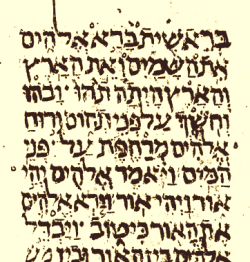7 Hebrew Words
As I mentioned back in December, I’ve been thinking of sharing some of my thoughts from the Biblical Anthropology series that we did last year at our church here in Mexico. So, here’s part 1!

About 3500 years ago, and old man begin to write. The first three words completely change our understanding of reality. The first seven words change our understanding of the cosmos. And with just a few phrases, our understanding of how the world works, who we are, the purpose of life and the concept of love is completely transformed.
These words are so revolutionary, so surprising, so transforming, that we really cannot exaggerate their importance.
But of course that begs the question – should we really be sitting around pondering the nature of reality and the natural laws of the universe? Aren’t there more practical things to be talking about?
Here’s the thing. There is a revolution going on in the world today. In some ways it’s something new, in some ways it’s the same old thing. But every day, people in the world are trying to tell us how to act, how to talk – even how to think. And the frustrating thing is that those “instructions” seem to change every day!
Recently I hear someone say that today’s youth have to log onto social media each and every day to find out what they’re supposed to believe. Which celebrity are we fans of now? Which one are we supposed to stop following? Who did something terrible, and why does “everyone” say it’s terrible? What are we supposed to be excited about?
Can you relate?
And listen, it’s not just that we must think what the crowd thinks. We must in fact celebrate what we’re “supposed to” celebrate, and punish those whom we’re “supposed to” punish.
So we’re not just talking about philosophy and private belief here. We are being pressured to change our lives, based on the beliefs of others.
When we did this series at our church, we called it “Biblical Anthropology”. It might not be the organized course that it sounds like. But basically, anthropology is the study of you and I – people. Those creatures that we call “humans”.
So anthropology is going to raise questions such as – Who am I? Why am I here? Do we have a purpose? What is freedom? What is right and wrong?
But we started with those three Hebrew words – five in my English (ESV) Bible: “In the beginning, God created . . .” And the seven Hebrew words, ten in my English translation:
In the beginning, God created the heavens and the earth.
Genesis 1:1
And what Moses goes on to say in the first verses and chapters of Genesis change everything.
And let me tell you, when I started the series last February, I had no idea how important these chapters really are.
Meditate on those words. There is a lot of truth in just that one verse.
For example, God exists! And it appears that He somehow exists outside of the space/time universe that we know. After all, He was already there, “in the beginning”.
This God has a will – He has a specific plan and purpose.
He’s creative. Powerful. He is the source of all things. And so He is not His creation – He is not part of the cosmos – He exists apart from it. However, apparently He can interact with it.
And as we continue to read Genesis 1, we’re told about the 6 days of Creation. God creates using words. And a big part of His creative work is separating, making limits, borders, and variety.
And here’s something else amazing – what He creates is “good”. So what? Well, this means that there is such a thing as “good”. In other words, there is more than just “is”. The cosmos is not just a random neutral thing without meaning or morality.
Here’s one sample glimpse of God’s creative work:
And God said, “Let the earth bring forth living creatures according to their kinds—livestock and creeping things and beasts of the earth according to their kinds.” And it was so.
Genesis 1:24
So once again, God uses words, and He separates – makes variety. And the creatures reproduce after their “kinds”. The basic idea here is that, since the beginning, there has been a biological separation between different types of creatures.
A dog has its own DNA, right? That’s the information in the dog’s body that explains how to make a dog. God placed that information into the dog’s cells, and that’s why a dog gives birth to puppies and not chickens.
Of course the puppies aren’t identical to their parents. There is information from both parents, for one thing. But the little one is not a totally different creature.
And so as we would say in modern terms, a species can certainly change and adapt over many generations, and that is a “built-in feature”. But each creature does indeed reproduce according to its “kind”.
As I said before, there is no way to overestimate the truths in these few verses. They really do change everything. And we haven’t even gotten to the part about humans yet.
